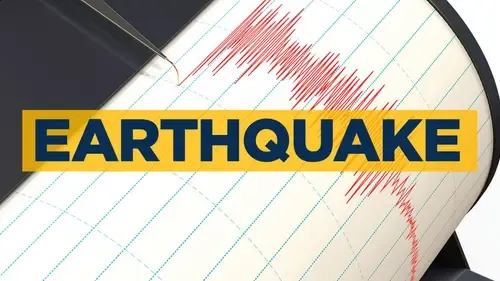What Happened During the 6.4-Magnitude Quake in Northwestern Venezuela?

Synopsis
Key Takeaways
- The earthquake measured 6.4 on the Richter scale.
- It struck near Mene Grande in Zulia state.
- No significant damages or casualties have been reported.
- The quake was felt across multiple states and in Colombia.
- Venezuela has a long history of seismic activity.
Caracas, Sep 25 (NationPress) A powerful earthquake measuring 6.4 on the Richter scale struck northwestern Venezuela, as reported by the GFZ German Research Centre for Geosciences. The seismic event occurred around 10:21 p.m. local time on Wednesday. The quake's epicenter was located at a depth of 10.0 km, initially pinpointed at 9.75 degrees north latitude and 70.94 degrees west longitude.
The quake's epicenter was in proximity to the town of Mene Grande in Zulia state, approximately 600 kilometers west of Caracas, according to various media outlets.
This tremor was felt widely, including in the capital, Caracas. Fortunately, there have been no reported casualties or property damage to date, as noted by Xinhua news agency.
The earthquake's effects were felt across several states and even reached neighboring Colombia, prompting many to evacuate residential and office buildings near border areas.
Mene Grande is situated on the eastern shore of Lake Maracaibo, a significant region for Venezuela's oil industry, which boasts the largest proven oil reserves globally.
About an hour post-quake, Communications Minister Freddy Nanez revealed via the Telegram app that the Venezuelan Foundation for Technological Research recorded additional quakes with magnitudes of 3.9 and 5.4. However, he did not reference the earthquake noted by the USGS. He mentioned that the smaller quake occurred in Zulia state, while the larger one was recorded in Barinas state.
State-run television maintained its regular broadcast, including a science segment led by President Nicolas Maduro, without interruption during and after the evening quake.
Venezuela has a long history of devastating earthquakes, with records of destructive seismic activity for over four centuries. The national seismic catalog indicates that around 180 earthquakes have caused damage in the country.
Earthquakes primarily arise from the sudden release of energy along faults in the Earth's crust, usually due to tectonic plate movements. These plates are perpetually in motion but can become stuck due to friction. When the accumulated stress exceeds this friction, the rocks suddenly shift or break, releasing energy in the form of seismic waves that cause ground shaking.









